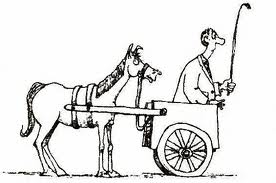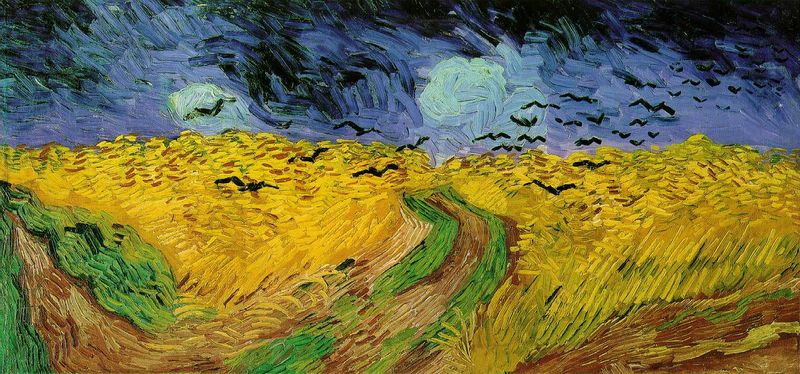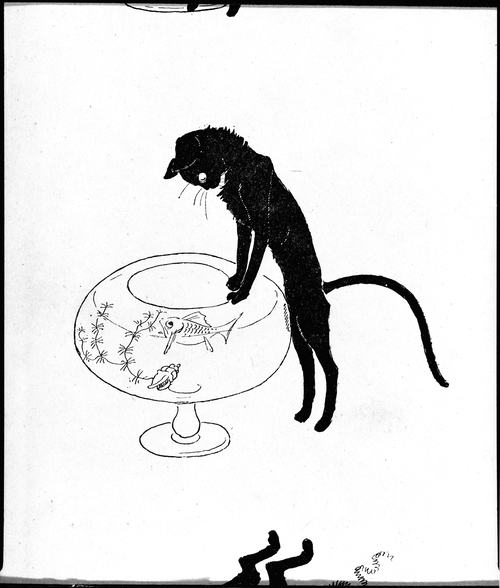돌다리도 두들겨 보고 건너라
stone-bridge-TOO knock try-AND cross-IMP
Try knocking on a stone bridge, too, [before you] cross.
The googletranslate has this as “Look before you leap.” But my list-o-proverbs has this as “Being a scaredy-cat.” I’m not sure these are the same at all, but I incline to the latter.
 This was hard to figure out, I had to cheat and look stuff up. There’s an old tradition that you knock (or kick, or stamp on) a wooden bridge before walking across it – presumably, to make sure it’s sturdy. So some people, to be extra careful, might knock on even a stone bridge before crossing, even though it’s probably more sturdy. So that’s either “looking before leaping” or being overly cautious, i.e. a scaredy-cat.
This was hard to figure out, I had to cheat and look stuff up. There’s an old tradition that you knock (or kick, or stamp on) a wooden bridge before walking across it – presumably, to make sure it’s sturdy. So some people, to be extra careful, might knock on even a stone bridge before crossing, even though it’s probably more sturdy. So that’s either “looking before leaping” or being overly cautious, i.e. a scaredy-cat.
Who’s leaping? Here’s a picture of a stone bridge at 금산사 [geumsansa = geumsan temple] that I took in 2010. I didn’t knock on it.

![]()
Category: 한국어 속담 (Aphorisms & Proverbs)
Caveat: 도토리 키 재기

도토리 키 재기
acorn height measure-GER
[…like] measuring the height of an acorn.
“It’s apples and oranges.” Trying to compare two things that aren’t really comparable.
![]()
Caveat: 달도 차면 기운다
달도 차면 기운다
moon-TOO full-WHEN wane-PRES
Even the moon wanes after it’s full.
“Every flow has its ebb.” Things go up and come down again. Bleah – no kidding.
Caveat: 나무만 보고 숲을 보지 않는다
나무만 보고 숲을 보지 않는다
tree-ONLY see-CONJ forest-OBJ see-PRENEG do-not-PRES
[You/She/He/They/Someone] don’t see the forest and only see the tree.
“Not seeing the forest for the trees.”
What, there’s a forest? This was quite easy to figure out, both grammatically and proverbially speaking. Yay.
Caveat: 길고 짧은 것은 대어 보아야 안다
길고 짧은 것은 대어 보아야 안다
be-long-AND be-short-PP thing-TOPIC measure- try-YA know-PRES
[You will] know [when you] try to measure a long and short thing.
“You never know until you try.” True.
What should I try?
Caveat: 서울에 가야 과거를 급제하지
서울에 가야 과거를 급제하지
Seoul-TO go-GOAL civil-service-exam-OBJ pass-TAG
[…like] passing the civil service exam in order to go to Seoul.

“Nothing ventured, nothing gained.” This proverb is easy to understand in the conext of the meritocratic system that existed in the pre-modern period, when one of the few avenues of social mobility open to “regular” people was to ace the civil service exam. It was viewed as a way to get ahead. And so, if you want to go to Seoul (i.e. become successful), you have to try to take the exam. You have to try to get somewhere.
The image at right, found online without authorial attribution, is described to have been taken at a “Joseon civil service exam reenactment” – wow, talk about too much excitement.
![]()
Caveat: 상상과 실지와는 딴판이었다
상상과 실지와는 딴판이었다
imagine-AND reality-AND-TOPIC great-difference-is-PAST
Imagined [thing] and reality were a great difference.
 “Reality differs greatly from what’s imagined.”
“Reality differs greatly from what’s imagined.”
This proverb has a different provenance from those previous ones I’ve posted. I’m not sure it can even be properly called a proverb – it’s just a sentence I found in my dictionary on my new phone, as an example of usage for the word 실지 (reality, practicality). But I like a lot of the example sentences I’ve run across there, so when I run across one I’ll use it. My spreadsheet full of aphorisms and proverbs isn’t used up, by any means, but I’ll vary the source I guess.
I’m sleepless at 430 am. Not sure what’s going on – I woke up wide awake in the middle of the night. Sometimes, that just happens. I can’t identify a pattern to it, really, but many years ago, I decided that the best strategy was to get up and do something rather than lie there and be insomniac. So I’m surfing the interwebs, listening to music, and contemplating the differences between reality and my imagination.
The little illustration’s quote: “Everything you can imagine is real.”
![]()
Caveat: 학생들이 좋아하는 교사의 특성
 My boss frequently likes to hand out these massive photocopied booklets of vaguely pedagogical value.
My boss frequently likes to hand out these massive photocopied booklets of vaguely pedagogical value.
I say vaguely, because I really can’t judge, seeing as they’re in Korean. To me, their value is vague. But I do see them as an opportunity for a Korean lesson, sometimes. So I stuff them in my backpack and bring them home, and on lazy weekends, such as the one just ending, I pull one of them out and spend some time attempting to make sense of it.
Curt likes pithy aphorisms and inspirational snippets. They appeal to me too – partly because they’re less overwhelming to try to read than whole dense paragraphs. Hence my long [broken link! FIXME] series of efforts to translate various Korean proverbs and aphorisms.
Anyway, he has a page in one of his recent booklets that lists the (alleged) qualities of a good teacher. Here’s that list, with my effort at translation following.
학생들이 좋아하는 교사의 특성
1. 교수법이 능숙하다
2. 열심히 가르친다
3. 온순하다
4. 운동을 좋아한다
5. 명랑, 쾌활해라
6. 공평무사
7. 머리가 좋다
8. 지식이 풍부하다
9. 유익한 이야기를 한다
10. 판서를 잘한다
11. 잘 돌봐 준다
12. 최미가 다양하다
13. 실력이 있다
14. 연구심이 있다
15. 친절
16. 정돈되어 있다
17. 유머
18. 건강하다
19. 언어가 명확하다
20. 나이가 젊다
The Characteristics of Teachers That Students Like
1. Proficient in teaching
2. Works hard at teaching
3. Is humble
4. Likes to exercise (or practice – this is ambiguous)
5. Cheerful and lighthearted
6. Fair
7. Good head (or good hair! – given Korean cultural obsession with “good hair” this might be the meaning)
8. Has a wealth of knowledge
9. Informative conversation
10. Good at writing
11. Takes good care
12. Variety of hobbies
13. Has skill
14. Has a spirt of inquiry
15. Kind
16. Organized
17. Humor
18. Healthy
19. Uses clear language
20. A youthful age (as in “young for his/her age”)
Most of these I can agree with and understand. I’m a little worried about the “good hair” one, though. It might mean the ruin of my teaching career.
![]()
Caveat: 기지도 못하면서 뛰려고 한다
기지도 못하면서 뛰려고한다
crawl-PRENEG-TOO cannot-do-IF run-TRY-PRES
[Someone] tries to run if [he/she] cannot crawl first.
 “Trying to run before you can walk.” Or, maybe, this is kind of like the proverbial “Putting the cart before the horse.” This seems to happen a lot in Korea. They need to remember this proverb when running a business. Just a thought.
“Trying to run before you can walk.” Or, maybe, this is kind of like the proverbial “Putting the cart before the horse.” This seems to happen a lot in Korea. They need to remember this proverb when running a business. Just a thought.
I slept badly last night. Good thing today is Sunday. I plan to be very lazy today – I have substantial skills in this area.
![]()
Caveat: 궁하면 통한
궁하면 통한다
be-at-wit’s-end-WHEN pass-through-PRES
When at wit’s end [something] comes through.
“There is always a way out.” I think this is true.
There are, in fact, so many ways out of any bad situation.
Caveat: 구르는 돌에는 이끼가 끼지 않는다
 구르는돌에는 이끼가 끼지 않는다
구르는돌에는 이끼가 끼지 않는다
roll-over-PRESPART stone-LOC-TOPIC moss-SUBJ gather-PRENEG not-PRES
Moss doesn’t gather on a rolling stone.
“No moss gathers on a rolling stone.” Wow – this proverb is such a close translation that I suspect it’s a translation.
I thought that perhaps it was biblical, but it’s apparently not – it’s attributed to Roman writer (and proto-stand-up-comic) Publius Syrus. Or is it self-evident enough that it evolved separately in the sinosphere (China/Korea/etc.)?
![]()
Caveat: 곡식은 익을수록 머리를 숙인다
곡식은 익을수록 머리를 숙인다
grain-TOPIC ripen-“increasingly-as” head-OBJ bow-PRES
As grain grows more ripe the head bows more.
“With age comes humility.” I guess that’s true. I’ve been feeling my age a lot, lately. It’s humbling when it’s not humiliating.

Van Gogh, “Wheat Field With Crows.”
![]()
Caveat: 고양이에게 생선을 맡기다
 고양이에게 생선을 맡기다
고양이에게 생선을 맡기다
cat-TO fish-OBJ entrust
[Like] entrusting a fish to a cat.
“Like letting a fox watch the henhouse.”
Not a good idea.
![]()
Caveat: 고생 끝에 낙이 온다
고생 끝에 낙이 온다
hardship end-AT happiness-SUBJ comes
After hardship comes happiness.
“Hard work brings success.” OK. True. I should remember to tell this to my students.
Caveat: 가랑비에 옷 젖는 줄 모른다
가랑비에 옷 젖는 줄 모른다
drizzle-IN clothing be-damp-PART line not-know-PRES
[Like] not knowing [about] damp clothes on the line in a drizzle.
“The little things add up over time.” That can be true about negative things or positive things, but clearly this is referring more to the negative. I wonder how closely it might correlate, alternately, with the straw that broke the camel’s back? I should ask someone.
Caveat: 절약이 돈 버는 것
절약이 돈 버는 것
thrift-SUBJ money make[money]-PART thing
Thrift is a money-making thing.
“A penny saved is a penny earned.” Well, yes, the whole frugality thing, right?
I have good days and bad days, on that. Certainly, I try to live within my means, even as my “means” have been cut by about 75% over the last half decade. I made the decision, at some point, that money wasn’t the main thing in my life. But it still has to be dealt with – managed.
Caveat: 세월이 약이다
세월이 약이다
time-SUBJ medicine-is
Time is medicine.
“Time heals all wounds.” Unless the wound gets infected. When that happens, all bets are off.
Caveat: 보지 않으면 잊혀진다
보지 않으면 잊혀진다
see-PRENEG is-not-IF forget-PASSIVE-CAUSATIVE
If [it] is not seen it becomes forgotten.
“Out of sight out of mind.” Yes, this is true. Like my blog. If you don’t see it, you forget it. That’s OK.
Caveat: 쇠뿔도 단김에 빼라
쇠뿔도 단김에 빼라
bull’s-horn-TOO at-once dodge-COMMAND
Dodge the bull’s horn at once.
“Strike while the iron is hot” is the translation offered for this expression on various websites and Korean-English dictionaries. I don’t like how no one tries to actually translate the literal meaning of the proverb – they just offer “Strike while the iron is hot.” But there’s no striking, no iron, no hotness – not in the actual Korean proverb. What there is is a bull’s horn and some kind of dodging or evading or removing. 단김에 seems to be a variant of 단결에 “in a body, in combination, in solidarity” and therefore “at once.”
Caveat: 짖는 것은 무는 것만 못하다
짖는 것은 무는 것만 못하다
bark-PART thing-TOPIC bite-PART thing-ONLY can’t-do
That which barks isn’t sufficient to bite.
“One’s bark is worse than one’s bite.” The ~만하다 ending means “is sufficient to” in one of my grammar books, so I decided that ~만 못하다 must mean “isn’t sufficient to” – but what I’m not confident about is how this works when attached to the periphrastic ~는 것 “that which ~”. I just kind of ignored that aspect in the second half of the sentence.
Speaking of bark worse than bite: my boss. Just sayin’.
Caveat: 어떤 사람에게는 좋은 것이 다른 사람에게는 싫은 것
어떤 사람에게는 좋은 것이
what-way-PART person-TO-TOPIC is-good-PART thing-SUBJ
다른 사람에게는 싫은 것
is-other-PART person-TO-TOPIC hate-PART thing
A thing good for one person [is] a thing hated by another person.
“One man’s meat is another’s poison.” And other proverbs in similar vein.
One of my [broken link! FIXME] most-liked students, who had quit Karma last year, has resumed at Karma this week. I’m so pleased.

![]()
Caveat: 좋은 일은 좋은 일로 보답을 받는 법
좋은 일은 좋은 일로 보답을 받는 법
good-PART work-TOPIC good-PART work-BY reward-OBJ receive-PART rule
The rule that a good deed receives a good reward through good work
“One good turn deserves another.” But I noticed this isn’t really a sentence – it’s a noun phrase centered on the noun 법 (rule) – it can also mean process. That’s something that’s striking about so many of these proverbs – they’re not grammatical sentences. This is true of English proverbs, too – e.g. “An eye for an eye” – there’s no verb, see? It can make them harder to figure out the translation.
If you’re feeling down, do something nice for someone.
Caveat: 자라 보고 놀란 가슴 솥뚜껑 보고 놀란다
자라 보고 놀란 가슴 솥뚜껑 보고 놀란다
turtle see-AND surprise-PRESPART heart kettle-lid see-AND surprises
A heart that is surprised by a turtle is surprised by a kettle lid.
“Once bitten, twice shy.” I could never have deduced this proverb’s English equivalent without the online translation being provided – I didn’t get the syntax, especially the fact that in this case the present participle ending on the first serial verb (“see and be surprised”) is doing duty as a relative clausifier – which is allowed of course.
Caveat: 시도하지 않으면 얻는 게 없다
시도하지 않으면 얻는 게 없다
attempt-PRENEG not-be-IF get-PRESPART NOMINALIZER there-is-not
If nothing is attempted [then] there is no getting.
“Nothing ventured, nothing gained.” I was puzzled by the particle 게 for a long time, until finally I decided (perhaps correctly, perhaps not) that it was a contraction of 것이, which is a nominalizing particle (attached to the preceeding present participalized verb) with a subject case marker. The grammar was hard, but the meaning pretty obvious.
I’m going to gain nothing this weekend, because I’m venturing nothing. Bleah.
Caveat: 세 살 버릇 여든까지 간다
세 살 버릇 여든까지 간다
three year habit eighty-UNTIL goes
A three year habit goes up to eighty.
This means that old habits die hard. I’ve been struggling with trying to drop old habits (mental habits) and gain new, better habits. For example, I had a habit of trying do something with Korean proverbs in this blog, for a while, but then I lost that habit. So I’m trying to bring it back. It’s hard.
Caveat: 누워서 떡 먹기
누워서 떡 먹기
lie-down-SO rice-cake eat-GERUND
[It’s like] lying down and eating rice-cake (tteok).
This proverb or expression is similar to the English “piece of cake,” meaning something is very easily done: nothing is quite as easy as lying down and eating some tteok – Korean style rice cake.
Caveat: 무소식이 희소식
무소식이 희소식
no-news-SUBJ good-news
No news is good news.
This is really easy. But… there’s no verb. A lot of Korean proverbs seem to be like that.
It’s true, too. No news is good news, right? I do get annoyed, sometimes. I have some people who will email me and say, “how come I never hear how you’re doing?” I really want to say, “Hey, I post twice a day to my blog for you. I’m not doing it for the internet.” There is, I concede, a certain impersonalness to the blog. Still… it should be sufficient to show that I’m doing OK, shouldn’t it?
[Daily log: walking, 2 km]
Caveat: 낫 놓고 기역 자도 모른다
낫 놓고 기역 자도 모른다
sickle lay-AND ‘giyeok’ letter doesn’t-know
[…like] laying down a sickle and not recognizing the letter ‘giyeok.’
[giyeok is written ㄱ]
This means “he doesn’t know his ass from a hole in the ground” and variations on that theme. It’s based on the idea that the Korean letter named ‘giyeok,’ which is written ㄱ, is evidently a sickle shape. To not know that is to be illiterate, and thus not particularly well-informed.
Caveat: 그 아비에 그 아들
그 아비에 그 아들
that father-TO that son
[…like] father [like] son.
Every language has this proverb. It’s too easy.
That’s my mood: I wanted something easy. I’m really not feeling well. I must be healthy for my upcoming trip.
[Daily log: walking, nowhere]
Caveat: 등잔 밑이 어둡다
등잔 밑이 어둡다
oil-lamp base-SUBJ is-dim
It’s dim at the base of the lamp.
People can’t see what’s in front of them. We all have trouble with this, right? Hmm, I wonder what’s in front of me that I’m not seeing. If I knew, I’d be seeing it, right?
Caveat: 거짓말도 방편
거짓말도 방편
falsehood-word-TOO expedient
Even a lie is expedient.
The end justifies the means. Eh? I try not to live by this maxim, but I know lots of people believe it.
Yesterday I stayed late at work, which is why I didn’t exercise. This morning I feel unmotivated. No lie.
Caveat: 과부 사정 홀아비가 안다
과부 사정 홀아비가 안다
widow circumstance widower-SUBJ confront
The widower confronts [knows] the widow’s circumstances.
I don’t really know what this means. Googletranslate, oddly, translate the whole proverb as “It never rains but it pours,” which is to say, it’s matching it proverb-to-proverb from some source, but it definitely doesn’t have a clue as to how the components therefore fit together. Maybe it’s kind of like “takes one to know one”?
Being a widower, technically, myself, I’ve got to know!
[Daily log: walking, 5 km; running, 3 km]
Caveat: 웃는 낯에 침 뱉으랴
웃는 낯에 침 뱉으랴
smiling visage-AT spit spit-PROP
Shall we spit at a smiling face?
This is basically a proverb saying that someone is being ungrateful. It’s in an ironical propositive verb form of some kind, at least as best I can tell from my grammar.
Let’s be grateful, then.
